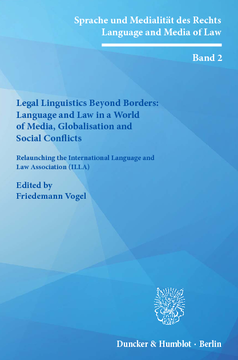
BOOK
Cite BOOK
Style
Format
Legal Linguistics Beyond Borders: Language and Law in a World of Media, Globalisation and Social Conflicts
Relaunching the International Language and Law Association (ILLA)
Editors: Vogel, Friedemann
Sprache und Medialität des Rechts / Language and Media of Law, Vol. 2
(2019)
Additional Information
Book Details
About The Author
Friedemann Vogel ist Professor für computergestützte Sozio- und Diskurslinguistik an der Universität Siegen, Koordinator der 1984 gegründeten Heidelberger Gruppe der Rechtslinguistik sowie Präsident der »International Language and Law Association« (ILLA, 2017-2019). Zuvor studierte er Germanistik, Psychologie und Philosophie, wurde 2011 an der Universität Heidelberg promoviert und war bis 2018 Juniorprofessor für Medienlinguistik an die Universität Freiburg. Er initiierte 2012 den Aufbau des weltweit größten Referenzkorpus des deutschsprachigen Rechts (JuReKo) und leitet gemeinsam mit Hanjo Hamann die »International Research Group Computer Assisted Legal Linguistics«. Zu Vogels Arbeitsschwerpunkten zählt die Fachkommunikation in Rechtswesen und Justiz, linguistische Diskurs- und Imageanalyse, politische und medienvermittelte Kommunikation sowie computergestützte, quantifizierende Zugänge zu sprachlichen Handlungs- und Interaktionsmustern als komplementäre Verfahren zu qualitativer Hermeneutik und Ethnographie. Nähere Informationen unter: www.friedemann-vogel.de.Abstract
The world of law has changed in the last decades: it has become more globalized, multilingual and digital. The sections and contributions of this volume continue the interdisciplinary discussion about the challenges of this change for theory and practice of law and for the International Language and Law Association (ILLA) relaunched in 2017. First, the book gives a broad overview to the research field of legal linguistics, its history, research directions and open questions in different parts of the world (United States, Africa, Italy, Spain, Germany, Nordic countries and Russia). The second section consists of contributions about the relation of language, law and justice in a globalized world with a focus on multilingual and supranational law in the EU. The third section focuses on digitalization and mediatization of the law, the last section reports about the discussion at the ILLA relaunch conference in 2017.The world of law has changed in the last decades: it has become more globalized, multilingual and digital. The contributions of this volume continue the interdisciplinary discussion about the challenges of this change for theory and practice of law and for the International Language and Law Association (ILLA) relaunched in 2017, introducing the research field of legal linguistics in different parts of the world and considering multilingualism, power abuse and mediatization of the law.
